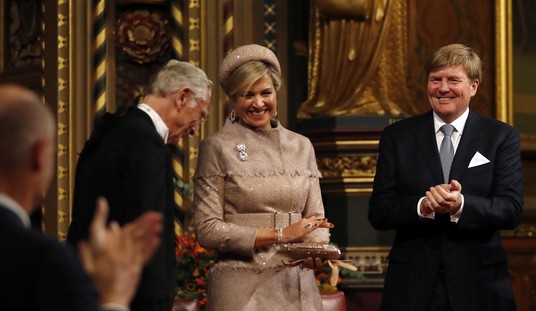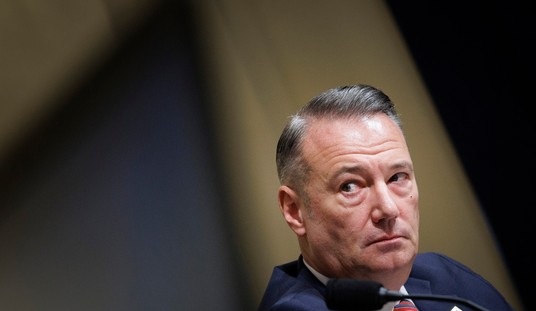I laughed when I got to the part of this Times story where “Administration officials said the idea had not been pushed with Mr. Trump and tried to tamp talk of it down.” I can just imagine how the chatter about a payroll tax cut got started in the Oval Office:
“If Powell doesn’t cut rates and we end up in a recession, I’m finished next year. We need a stimulus! Gimme ideas, now.”
“We’ve already cut income taxes, Mr. President. There’s always the payroll tax, I guess, but—”
“Payroll tax! Great idea. Let’s start pushing cuts.”
“No, wait. There are like eight different reasons why Pelosi would never–”
“Payroll tax cuts!”
“Wait.”
Too late!
President Trump on working to solve economic concerns: "Payroll tax is something that we think about and a lot of people would like to see that" https://t.co/LKwvtZnflM pic.twitter.com/aHbjgX3q0x
— CNN Politics (@CNNPolitics) August 20, 2019
Why would Trump’s advisors be more cautious than he is in advertising a payroll tax cut proposal? For the simple reason that (a) Pelosi won’t lift a finger to help Trump goose the economy, knowing how that would help him in 2020, and, more importantly, (b) she can actually turn this around on Trump and use it as leverage to showcase unpopular parts of the GOP’s own agenda. Presumably POTUS understands the first point and thinks that he can use Pelosi’s refusal as electoral fodder against the Dems: “We proposed a tax cut that would directly benefit the middle class, not the rich. Democrats normally love the idea of cutting the payroll tax. But Pelosi turned us down because she doesn’t care about you!” And it’s true, incidentally, that Democrats typically prefer cutting the payroll tax to cutting income taxes since the payroll tax is regressive. In a vacuum, they’d be interested in this idea.
But we’re not in a vacuum, we’re 14 months out from an election in which Trump’s chances rest almost entirely on the pillar of economic growth. If that pillar starts to crumble, Nancy Pelosi isn’t racing in to reinforce it with a payroll tax stimulus. And, contra Trump’s suspicions, I don’t think it’d be easy to scapegoat her for refusing either. She’d have a salable argument against cutting payroll taxes, namely, that doing so would increase the risk that entitlements will be underfunded. We must save Social Security and Medicare! Then she’d go on offense, using Trump’s payroll tax proposal to refocus public attention on the less progressive tax initiatives the White House has championed in the past. Rick Newman sees it coming:
Pelosi and her fellow Dems would probably embrace the idea of a payroll tax—then ask Trump for a bunch of concessions he couldn’t possibly agree to. In exchange for Trump’s payroll tax, Democrats would need to show their own political base they got something to help their own election odds in 2020. What might that be?
They could agree to a payroll tax cut in exchange for rolling back the 2017 tax cuts for businesses and the wealthy. Or they could ask for a more aggressive estate tax and use the money raised to fund social programs. Or they could insist that the $10,000 cap on the deductibility of state and local income taxes, which hit Democratic states harder than Republican ones, be repealed. They could ask for all of those things.
Trump would say no to all of that, of course. The point here is to stimulate the economy by putting more money into the hands of taxpayers to spend, he’d note, not to take it out of the hands of the rich and deposit it into the Treasury. Nonetheless, lefties would use the debate to revisit all sorts of unpleasant trivia about the 2017 tax cuts that undercut Trump’s populist image:
If Trump wanted a 2020-friendly tax cut that disproportionately boosted middle and lower incomes, that was a viable option. Instead average tax cut for the bottom 20% of earners was $40, next 20% was $320, and $780 for the middle 20%. The top 1% got $32k. https://t.co/G1U5DF5IqK
— Benjy Sarlin (@BenjySarlin) August 20, 2019
Not only would Trump not end up getting his payroll tax cut, he’d end up with a snoutful of damaging Democratic messaging on tax policy for his trouble. Even if, against all odds, he managed to work something out with Pelosi, there’s no guarantee that he wouldn’t change his mind halfway through negotiations after Hannity or whoever started complaining loudly about the concessions he made to get a deal. And if that happened, with Trump walking away from a deal suddenly, Pelosi would then be able to argue that he’s the one ultimately who didn’t care enough about the middle class to make payroll tax cuts happen, not her.
His advisors see all of this coming from a mile away, which is why they’re eager to tell reporters that this idea isn’t seriously being pushed. Trump himself seems less concerned.
I wonder how he would react if Pelosi offered him a payroll tax cut in exchange for universal background checks on gun purchases. That’d be hugely risky on her part since both prongs of that deal would be very popular; if Trump agreed, he’d get a double shot of goodwill from the electorate, making it a huge miscalculation by Dems. The gamble on her part would be that he’s too afraid of disappointing his most populist fans on gun rights to agree to a deal like that and thus would rule out a measure that enjoys 90 percent popularity across the country. If/when he did, Pelosi would have a double whammy to use against him: “We were willing to work with the president to help the middle class but apparently he cares more about letting people buy guns without accountability than he does about putting money back in the pockets of the middle class.” Here he is this afternoon sounding more skeptical about expanding background checks after sounding much more enthusiastic two weeks ago.
Trump once again backs away from strong gun control measures pic.twitter.com/MXXkVJ6drZ
— TPM Livewire (@TPMLiveWire) August 20, 2019








Join the conversation as a VIP Member